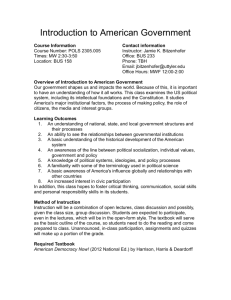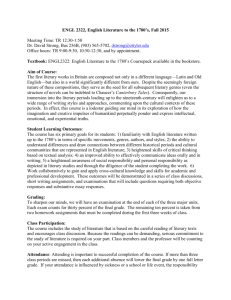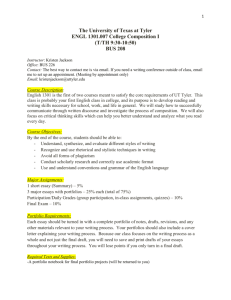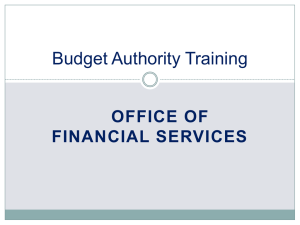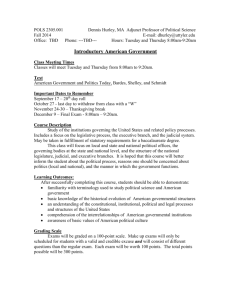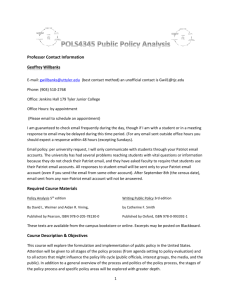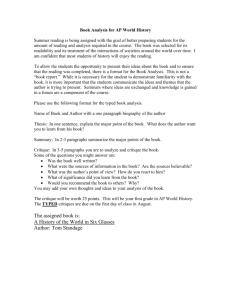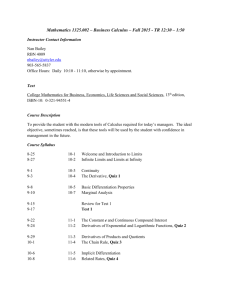Syllabus Eng 227 Young Adult Literature
advertisement
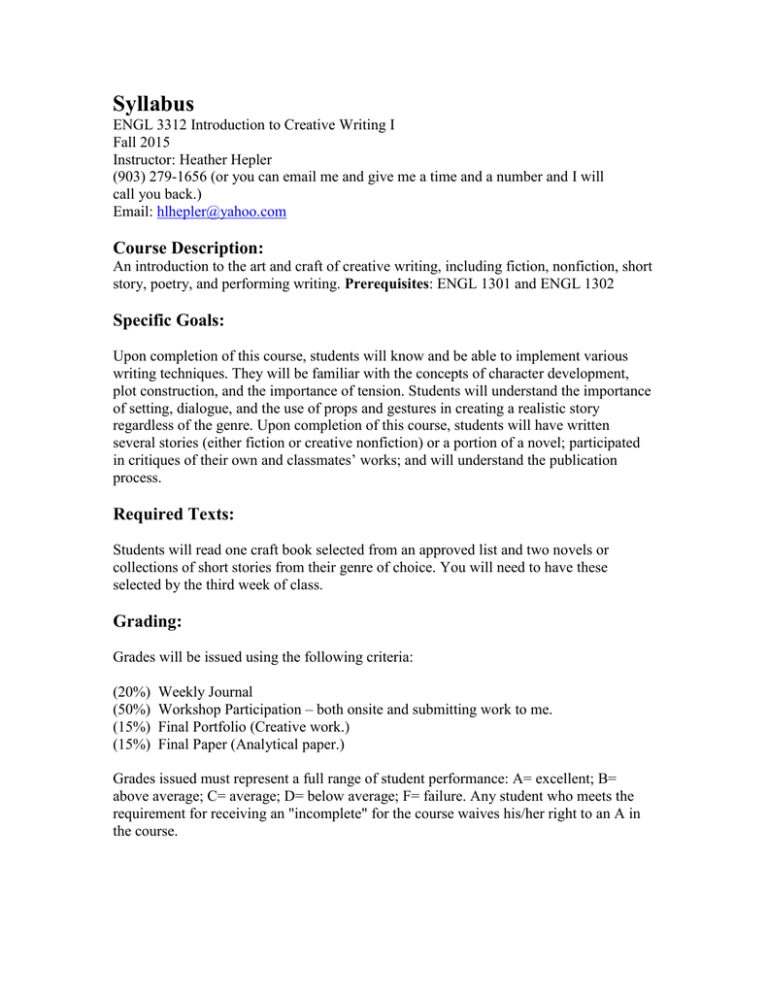
Syllabus ENGL 3312 Introduction to Creative Writing I Fall 2015 Instructor: Heather Hepler (903) 279-1656 (or you can email me and give me a time and a number and I will call you back.) Email: hlhepler@yahoo.com Course Description: An introduction to the art and craft of creative writing, including fiction, nonfiction, short story, poetry, and performing writing. Prerequisites: ENGL 1301 and ENGL 1302 Specific Goals: Upon completion of this course, students will know and be able to implement various writing techniques. They will be familiar with the concepts of character development, plot construction, and the importance of tension. Students will understand the importance of setting, dialogue, and the use of props and gestures in creating a realistic story regardless of the genre. Upon completion of this course, students will have written several stories (either fiction or creative nonfiction) or a portion of a novel; participated in critiques of their own and classmates’ works; and will understand the publication process. Required Texts: Students will read one craft book selected from an approved list and two novels or collections of short stories from their genre of choice. You will need to have these selected by the third week of class. Grading: Grades will be issued using the following criteria: (20%) (50%) (15%) (15%) Weekly Journal Workshop Participation – both onsite and submitting work to me. Final Portfolio (Creative work.) Final Paper (Analytical paper.) Grades issued must represent a full range of student performance: A= excellent; B= above average; C= average; D= below average; F= failure. Any student who meets the requirement for receiving an "incomplete" for the course waives his/her right to an A in the course. The minimum penalty for plagiarism is an "F" on the assignment; maximum penalties may be failure of the course and/or disciplinary action by the university. All work must be your own. Course Assignments: Lectures and Readings: Each week, you will have a lecture from me about some point of writing craft. You will also need to answer a series of questions each week in response to your reading. Writing Journal: Writing takes practice; a lot of practice. For this class, you will need to write at least five days a week. I’d like you to shoot for at least a page of writing every day. What you write is up to you. You can work on a novel or a series of short stories. Other days you might just write out an idea that came to you or do a character sketch or a scene. This assignment is simply to get you to write. It is up to you whether you decide to let others in your group see your journal. I’ll look at it just to make sure you are doing it. However, if you want me to read something specific, you’ll need to let me know. Workshops: Workshops will be held every two weeks. (A schedule is included, but we reserve the right to alter this if necessary.) Workshops will include two basic components: preparation and the actual workshop. Preparation. One week out from your workshop, you will submit 10 (ish) pages of fiction to your Blackboard group discussion board. You will also submit these pages directly to me via the Blackboard drop box. You will then have one week to read and critique the work of your other group members. You must write out your notes and have a hard copy of them for your workshop. (These will be given to the author upon completion of the critique. If you fail to submit your work on time, your group members are not obligated to critique it. However, you will still have to critique their work. Workshop. You will meet during your scheduled time. You will then have approximately 15 minutes to critique each piece. Final Portfolio: I am requiring you to submit a portfolio. This will include at least twenty pages of your own fiction. These pages should be clean and ready for submission to either a publisher or an agent. Final Paper: This is a response to the three books you chose to read as part of this course. (One book on craft and two works of fiction. Your responses should be at least 1000 words each. For this, you will focus on one element of craft and explore it, using specific examples from your texts. (More information on this later.) Submitting Assignments: Assignments will be submitted two ways; either through the Blackboard classroom groups or directly to me via the Blackboard drop box. Please submit your papers using a form of Microsoft Word or if that is not available to you, submitting it as a rich text format document or as a .pdf file. Assignments are due by midnight of the due date. Late assignments will lose one letter grade for each day that they are late. Contacting Me: I am at my computer all day long, so I will not restrict myself to traditional office hours and instead will attempt to be available, as you need me. This said, I will not be able to respond to every email as soon as it is sent. I do promise to respond to you within 24 hours unless I have indicated otherwise. If you should need to talk with me on the phone, simply email me with your number and a time that I might reach you and I will call you. Rules for Critiques 1. 2. 3. 4. 5. 6. 7. 8. 9. Critiques should always be about the work and never about the person. You should endeavor to be honest as well as kind in all of your critiques. You should, whenever possible, provide positive feedback as well as criticism. Critiques should focus on the quality of the work and the attention to the craft of writing, not on whether you “like the story” or whether a particular piece is “your type of fiction.” Be specific in your comments. Be available to answer follow-up questions from the author. Don’t take it personally. (Even if it seems personal.) I reserve the right to remove any postings that I deem inappropriate or that fall outside of the scope of these exercises. Finally, be kind, generous, truthful, specific, and thoughtful. Writing Submissions 1. Submissions should be no more than five pages double-spaced. All submissions should be in a standard font, such as Times New Roman or Arial. Submissions should be in 12 point and should have standard margins of one inch on all sides. Your submissions may be longer if your group members agree, but you will only be required to critique the first five pages. 2. You must post and email your submissions by the deadline or you forfeit the opportunity to have your work critiqued. You must still participate in critiquing your group member’s work regardless. 3. All submissions must be accompanied by a cover letter. In this you should address any specific challenges or questions that you have about your work. This is not the place to give context or “other information” about your work. Your work should stand alone. If it can’t, rethink your submission. University Policies Students Rights and Responsibilities To know and understand the policies that affect your rights and responsibilities as a student at UT Tyler, please follow this link: http://www2.uttyler.edu/wellness/rightsresponsibilities.php Grade Replacement/Forgiveness and Census Date Students repeating a course for grade forgiveness (grade replacement) must file a Grade Replacement Contract with the Enrollment Services Center (ADM 230) on or before the Census Date of the semester in which the course will be repeated. Grade Replacement Contracts are available in the Enrollment Services Center or at http://www.uttyler.edu/registrar. Each semester’s Census Date can be found on the Contract itself, on the Academic Calendar, or in the information pamphlets published each semester by the Office of the Registrar. Failure to file a Grade Replacement Contract will result in both the original and repeated grade being used to calculate your overall grade point average. Undergraduates are eligible to exercise grade replacement for only three course repeats during their career at UT Tyler; graduates are eligible for two grade replacements. Full policy details are printed on each Grade Replacement Contract. The Census Date is the deadline for many forms and enrollment actions that students need to be aware of. These include: Submitting Grade Replacement Contracts, Transient Forms, requests to withhold directory information, approvals for taking courses as Audit, Pass/Fail or Credit/No Credit. Receiving 100% refunds for partial withdrawals. (There is no refund for these after the Census Date) Schedule adjustments (section changes, adding a new class, dropping without a “W” grade) Being reinstated or re-enrolled in classes after being dropped for non-payment. Completing the process for tuition exemptions or waivers through Financial Aid State-Mandated Course Drop Policy Texas law prohibits a student who began college for the first time in Fall 2007 or thereafter from dropping more than six courses during their entire undergraduate career. This includes courses dropped at another 2-year or 4-year Texas public college or university. For purposes of this rule, a dropped course is any course that is dropped after the census date (See Academic Calendar for the specific date). Exceptions to the 6-drop rule may be found in the catalog. Petitions for exemptions must be submitted to the Enrollment Services Center and must be accompanied by documentation of the extenuating circumstance. Please contact the Enrollment Services Center if you have any questions. Disability Services In accordance with Section 504 of the Rehabilitation Act, Americans with Disabilities Act (ADA) and the ADA Amendments Act (ADAAA) the University offers accommodations to students with learning, physical and/or psychiatric disabilities. If you have a disability, including non-visible disabilities such as chronic diseases, learning disabilities, head injury, PTSD or ADHD, or you have a history of modifications or accommodations in a previous educational environment you are encouraged to contact the Student Accessibility and Resources office and schedule an interview with the Accessibility Case Manager/ADA Coordinator, Cynthia Lowery Staples. If you are unsure if the above criteria applies to you, but have questions or concerns please contact the SAR office. For more information or to set up an appointment please visit the SAR office located in the University Center, Room 3150 or call 903.566.7079. You may also send an email to cstaples@uttyler.edu<mailto:cstaples@uttyler.edu> Student Absence due to Religious Observance Students who anticipate being absent from class due to a religious observance are requested to inform the instructor of such absences by the second class meeting of the semester. Student Absence for University-Sponsored Events and Activities If you intend to be absent for a university-sponsored event or activity, you (or the event sponsor) must notify the instructor at least two weeks prior to the date of the planned absence. At that time the instructor will set a date and time when make-up assignments will be completed. Social Security and FERPA Statement It is the policy of The University of Texas at Tyler to protect the confidential nature of social security numbers. The University has changed its computer programming so that all students have an identification number. The electronic transmission of grades (e.g., via e-mail) risks violation of the Family Educational Rights and Privacy Act; grades will not be transmitted electronically. Emergency Exits and Evacuation Everyone is required to exit the building when a fire alarm goes off. Follow your instructor’s directions regarding the appropriate exit. If you require assistance during an evacuation, inform your instructor in the first week of class. Do not re-enter the building unless given permission by University Police, Fire department, or Fire Prevention Services This syllabus is subject to change, so long as all students are notified of the changes and all changes apply to all students in the class equally, and so long as the changes are in keeping with university policies and standards.
